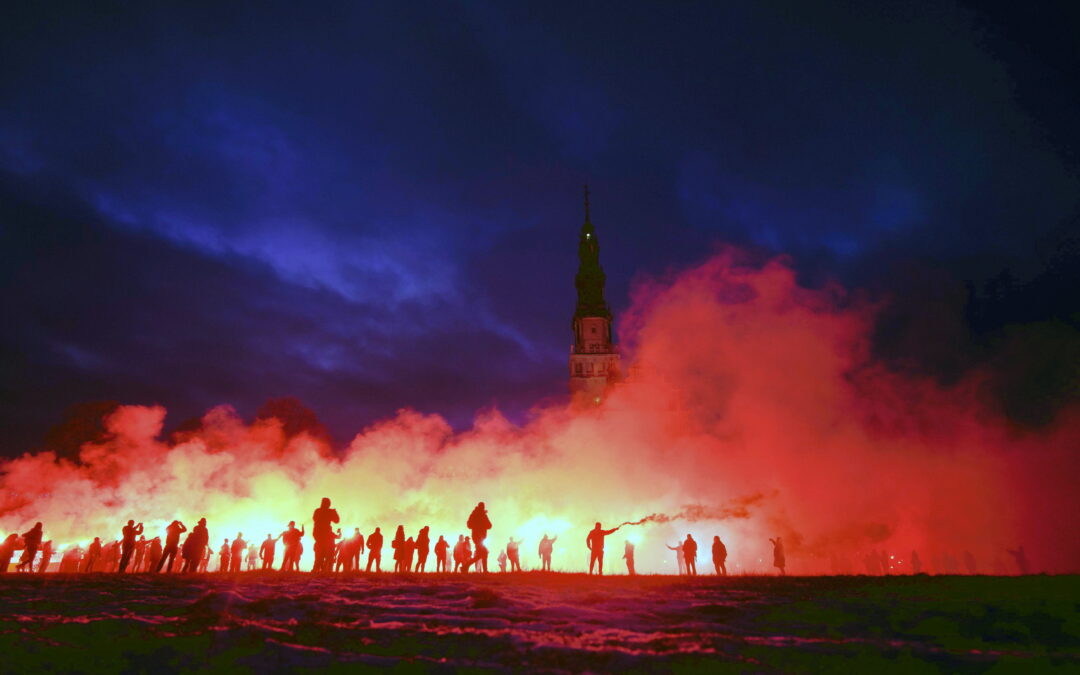Football fans from around Poland put aside their rivalries and gathered at Poland’s holiest Catholic shrine – Jasna Góra monastery in Częstochowa – on Saturday for the 14th annual “Patriotic Pilgrimage of Fans”.
Participants held scarves and banners bearing the emblems of their football teams – as well as slogans such as “I will never renounce my ancestry” and “Poland has not perished” – which were blessed by priests.
As in previous years, nationalist imagery and slogans were present. Among the chants heard from participants was “communists will hang”. One was pictured with a scarf bearing Celtic crosses – a symbol often used by white supremacists – and another wore a mask featuring an image of a razor blade.
Pod hasłem „Polska Kibolska” na Jasną Górę przybyła 14. Patriotyczna Pielgrzymka Kibiców. Na błoniach odbył się koncert pieśni patriotyczno religijnych. Wrażenia niezapomniane… pic.twitter.com/mmCwPikI3x
— Stumbras (@Stumbras997) January 9, 2022
This year’s pilgrimage was held under the slogan “Polonia semper fidelis” (Poland always faithful). Explaining its meaning, Father Jarosław Wąsowicz told the fans in a sermon that Poland has “been made an arena of total war”, caught between “the secularised West” and “the East, which exploits this self-destruction”.
“There have been times in history when the future of Europe depended on the blood we shed and our determination,” declared Wąsowicz, quoted by Niezależna. “Today we also play such a role.”
“Everything is at stake: not only what Poland will be – and whose – but also Europe,” added the priest, who is the main organiser of the event. “History teaches us that whenever we were faithful to the unchanging values of the Gospel, we were able to overcome the greatest difficulties…Only our faithfulness can save us once again.”
„Polska zawsze wierna” pod takim hasłem na #JasnaGóra odbywa się 14.Patriotyczna Pielgrzymka Kibiców. Fani, głównie piłki nożnej, różnych klubów sportowych spotykają się, by wspólnie modlić się, pokazać jedność w różnorodności i to, że kibicowanie „nie kłóci się”z wyznawaną wiarą pic.twitter.com/ooi0DtK6b9
— JasnaGoraNews (@JasnaGoraNews) January 8, 2022
After the service, Karol Nawrocki, the head of the state Institute of National Remembrance (IPN), held a meeting to outline the work his organisation does to commemorate historical heroes.
“I am here to thank the fans for holding up the flame of historical truth and to speak about Polish heroes who can inspire them to further initiatives,” said Nawrocki, quoted by Niedziela.
Fans of various clubs told the newspaper that the pilgrimage was a time to put aside traditional rivalries and unite. “We don’t have to like each other, but we have to respect each other…especially since we all pray for our country and together we defend our faith,” said Jarosław, a fan of Lechia Gdańsk.
The event, which first took place in 2009, has often drawn thousands of participants in the past, though attendance has been restricted by the pandemic. Last year’s pilgrimage saw just a small selection of representatives of clubs attend, while this year’s drew hundreds.
Patriotyczna Pielgrzymka Kibiców na Jasną Górę!
foto: Bartłomiej Romanek / https://t.co/jIGFIjdovt pic.twitter.com/JsC9cMFp4Y
— Avanti (@Avanti_1989) January 8, 2022
In the evening, a number of fans gathered outside, waving flares and singing. Among the chants were anti-communist ones often heard at nationalist events, including “communists will hang on trees instead of leaves”.
Pilgrimages by right-wing groups to Jasna Góra, which hosts the Black Madonna icon, have drawn controversy in the past. An annual pilgrimage of nationalists, for example, has been accompanied by torch-lit marches with flags and banners bearing far-right symbols.
In response, in 2020 the monastery issued new regulations stating that “events organised in the sanctuary must not be an opportunity to manifest any political views whatsoever, or any social views that contradict the teaching of the church”.
“It is strictly forbidden to promote non-Christian attitudes and ideologies in Jasna Góra, in particular ethnic divisions, hostility, contempt, racism, xenophobia, nationalisms and fundamentalisms,” read the rules.
Main image credit: Grzegorz Skowronek / Agencja Wyborcza.pl

Daniel Tilles is editor-in-chief of Notes from Poland. He has written on Polish affairs for a wide range of publications, including Foreign Policy, POLITICO Europe, EUobserver and Dziennik Gazeta Prawna.




















